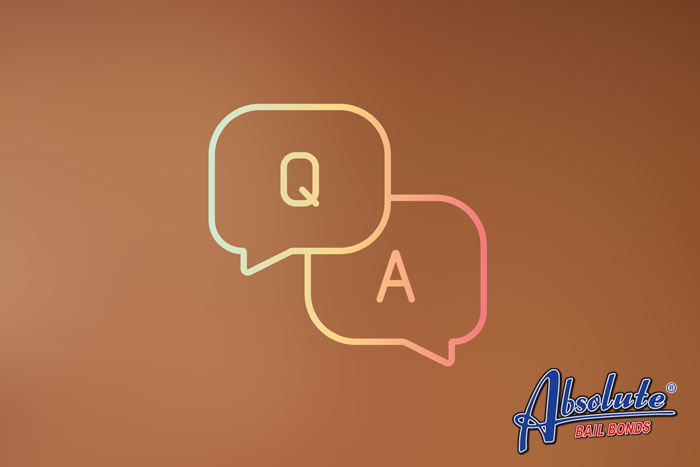
Understanding How Bail Works With Absolute Bail Bonds
We understand how bail can be a stressful and confusing situation. Let us reduce your stress as our professional and fully licensed bail bondsmen walk you through the bail bond process, answering all your questions.
The bail bond process is quite simple. Of course, there is going to be its share of legal print, but overall, it’s very understandable.
Question: What is a bail bond for?
Answer: A bail bond is a written promise that the defendant will pay a fixed amount of money for his or her release from jail. The fixed amount will be 10% of the full bail amount.
Question: Does the full fixed amount need to be paid upfront before the defendant can be released?
Answer: No. The bail bond company will calculate a workable payment plan the defendant will be released from jail and following that, payments on the bail bond will continue to be made.
Question: What are the contingencies?
Answer: The defendant is required to show up for all court dates. If the court has additional mandates, like attending counseling, staying away from someone, or someplace, and not leaving the state, for example, the defendant will need to abide by these as well.
Question: What if they don’t?
Answer: The bail bond will be revoked, and the defendant will be taken back into custody. In addition, the full bail amount may need to be paid off.
Question: Is the money refundable at the end of the trial, if my loved one obeyed all his or her orders?
Answer: No. Think of the fixed price for the bail bond as a fee for the bail bond services. But, most people use bail bonds to bail out of jail because, in the long-term view, it is more affordable for them.

Absolute Bail Bonds Q&A
Do You Need to Pay Bail?
If you’re wondering if you need to pay bail, the simple answer is no. Bail is an amount of money (and sometimes conditions that have to be met) that you have to pay if you wish to be released from jail while your case makes it way through the legal process.
Just because bail has been set, you don’t have to pay it. Some people opt to remain incarcerated while others would prefer to go free. The choice is yours.
Do you Need to Use a Bail Bondsman?
Some people believe that they need to use a bail bonds company in order to cover their bail and be released from jail. The truth is that you don’t need to. If you have enough money on your own, you can pay your own bail or have a friend cover the expense.
How Complicated is the Process?
The bail bond process is one of the simplest aspects of the judicial process. Shortly after you’ve been charged and arrested, you go before a judge who determines the amount of your bail. At this point, you have the option of paying it or of returning to your cell. If you chose not to bail yourself out right away, you still have the option of doing so at a later date.
If you contact us and ask for our help, we require:
- Proof of Residency
- A valid state-issued identification card or driver’s license
- A pay stub or bank statement that shows regular deposits
We provide everyone who contacts us with a free consultation. During the consultation, you’ll speak to a highly experienced bail bond agent who will patiently answer all of your questions and guide you through the bail bonds process. Taking advantage of this consultation is completely free of obligation.
We have a great deal of experience with the local court system and will do everything in our power to expedite the process so you can return to your family and job.
How Difficult is it to Reach Absolute Bail Bonds?
We’re incredibly easy to reach. We’re available 24 hours a day 7 days a week. We promise to handle your case with compassion. The sooner you contact us, the sooner we’ll help you walk away from jail. Feel free to call us at (800)793-2245.

False Allegations of Child Abuse in California
Child abuse laws are designed to protect children from being hurt. They’re good laws that make a lot of sense. Unfortunately, they are also laws that can be used against people, particularly parents who are engaged in a child custody dispute. It’s not unheard of for one parent to accuse the other parent of child abuse in order to obtain full custody of the children. It’s an accusation that can deal a lasting blow to both sides.
While there have been instances of men lodging false child abuse claims against women, it’s far more common for a woman to falsely accuse a man of child abuse. Data collected by the Stop Abusive and Violent Environments (SAVE) indicates that 85% of all child abuse protective orders are filed by men and issued against men. One lawyer estimates that approximately 90% of those that are filed during a divorce and that mention child abuse are a tactical move to gain custody of the children.
California’s family court judges are legally obligated to take all child abuse accusations seriously. The last thing anyone wants is for a child to be hurt because the court failed to act. As soon as one parent accuses the other of child abuse, the court will take action, usually siding with the parent who made the accusation. If you are the one accused of abusing children, you shouldn’t assume that you’re promptly out of luck. You do have to be willing to take a defensive stance.
It’s in your best interest to demand that the court investigate the accusations. Be prepared for this to involve an in-depth and invasive investigation into your background. Court-appointed experts will interview several people which can include:
- Your children
- Family
- Friendly
- Doctors
- Teachers
The process is time-consuming and often frustrating. When you feel impatient, remind yourself that you’re doing this for the good of your child.
The topic of false child abuse accusations in California is addressed in Family Code section 3027. According to the code, once it’s proven that the allegations filed against you were knowingly false, you have the right to seek monetary compensation for your court fees and additional costs that were connected to proving your innocence. The result of the investigation could lead to a significant change in which parent is granted custody of the children.

Mail Theft in California
Lawmakers aren’t fooling around when it comes to people messing with other people’s mail. The issue of mail theft is explored in US Code Section 1708. It’s important to understand that because mail theft involves the United States Postal Service, a federal agency, mail theft is considered a federal offense. The State of California will likely add a few charges as well.
What is Mail Theft
If you read US Code 18 Section 1708 you’ll learn that taking any piece of mail that wasn’t sent to you is considered mail theft. It doesn’t matter if the mail is taken directly from a post office employee, snatched from a mailbox, or snuck of a mail truck. It’s all mail theft.
Additional Offenses That Are Frequently Added to Mail Theft Charges
It’s rare for a person to be charged with just mail theft and nothing else. Identity theft is one the charge that’s most commonly linked to mail theft. Identity theft charges are usually added if the stolen mail included:
- Birthdates
- Social security numbers
- Birth certificates
- Tax I.D. numbers
- Banking/credit card account information
- Death certificate information
- School I.D. numbers
- Driver’s license numbers
Other charges that have been added to mail theft include:
- Assault
- Breaking and entering
- Embezzlement
- Deception
- Fraud
Federal Consequences of Mail Fraud
The government is messing around with mail theft. They want everyone to think twice about what they could lose before they snatch up a piece of unattended mail. If you’re found guilty of federal mail fraud, the maximum sentence includes:
- Up to $250,000 in fines
- Up to 5 years in a federal prison
Getting Charged with Mail Theft in California
California lawmakers are serious about mail theft. Anyone who is caught stealing someone else’s mail will likely find that in addition to dealing with the federal court, they’ll also be charged by the state. California’s Penal Code 530.5e PC states that “every person who commits mail theft, as defined in Section 1708 of Title 18 of the United States Code, is guilty of a public offense, and upon conviction therefor shall be punished by a fine, by imprisonment in a county jail not to exceed one year, or by both a fine and imprisonment.”
The interesting thing about California and mail theft is that it is one of the only theft type crimes where the punishment isn’t determined by the monetary amount of the crime. The state doesn’t care if you stole a couple of thousand dollars worth of mailed paychecks from your neighbor or if you simply swiped a handful of sales flyers from an unattended mailbag. The consequences will be the same.
What if Mail was Delivered to the Wrong Person?
If a postal employee delivers the someone else’s mail to you, don’t panic and assume that you’re going to be charged with mail theft. This is an honest mistake. It’s also something you need to take care of immediately. As soon as you discover the error, contact the post office, and alert them to the situation. You’ll be instructed on how to return the mail to the post office. What you shouldn’t do is throw the mail away or to put the mail in your neighbor’s mailbox.

Falling Asleep Behind the Wheel in California
We’ve all done it. Gotten behind the wheel and driven when we were tired. Most of the time rolling down the window, cranking up the radio, and indulging in a massive amount of caffeine is enough to get us safely where we need to be. The problem is that some people don’t make it to their destination. Some people fall asleep while they’re behind the wheel and find themselves in serious legal trouble.
The Dangers of Falling Asleep While Driving
People constantly warn us about driving while intoxicated. We know it’s dangerous and know that it’s a serious traffic offense. People rarely discuss the fact that driving while fatigued is equally dangerous. In most cases driving is monotonous. It’s so easy to let your eyes close for a second. That’s all it takes for us to fall asleep and get into a bad accident.
If you’ve ever driven while drowsy you’re not alone. The National Highway Traffic Safety Administration (NHTSA) reports that approximately 100,000 police-reported car accidents involved drowsy driving. It’s estimated that 72,000 of those accidents led to severe injuries and that 1,600 involved fatalities.
How California Handles Drowsy Driving Cases
Each time you get behind the wheel of your car, you’re entering into an unspoken, but legally binding contract with everyone that you’re fit for driving. Getting behind the wheel means that you plan on following all posted traffic laws, that you’ll stay alert, and that you’ll drive defensively. This means you won’t be distracted, you’re not intoxicated, and you’re not fatigued.
Failing to keep up your end of the agreement results in traffic tickets and possibly jail time.
If you’re caught driving while drowsy in California, at best, you’ll get a ticket for reckless driving. According to the state, you’re driving recklessly any time you, “drive any vehicle in a manner that exhibits willful or wanton disregard for the well-being of others on the roadway.” The state considers falling asleep and an example of willful or wanton disregard.
If you’re caught driving while drowsy, the best you can hope for is a traffic ticket that will cost you $145. That’s the best-case scenario. If you caused an accident, injured someone, created an intensely dangerous situation, or did a great deal of damage to someone else’s property, the consequences will be much more severe. The state has the option of sentencing you to 90 days in jail and charging you with a $1,000 fine.
Depending on your driving record, the driving while drowsy episode could result in you losing your license. If you injured or killed someone, you could face both manslaughter charges and a civil lawsuit.
The next time you think about driving while exhausted, you should reconsider and take a nap instead.

Are You Impacted by California’s Mandatory Reporting Law?
You just watched your neighbor commit a crime. You know what they did was illegal, but you aren’t sure what you should do about the situation. You don’t want to get anyone in trouble. On the other hand, you know you don’t like the idea of living next to someone who blatantly breaks the law.
Assuming that your neighbor didn’t do break a minor law, like jaywalking, it’s in your best legal interest to report the crime to the authorities. The reason for this is simple. If your neighbor gets caught and the police find out that you’ve been turning a blind eye to the situation, you could land in hot water. This is especially true if your neighbor is abusing a roommate/parent/friend, or if they are involved in a child endangerment/neglect situation.
Some people don’t realize that their chosen profession requires that they report any criminal activity that they have knowledge of. California created Mandatory Reporting laws that require specific professions to report criminal activity. Professionals who are bound to adhere to the Mandatory Reporting Laws include:
- School officials
- Anyone who works in law enforcement
- Social workers
- Members of the clergy
- Firefighters
- Therapists
If you are a member of any of these professions, you’re legally required to report instances of:
- Extreme verbal abuse
- Physical abuse/assault
- Sexual abuse
- Child neglect
- Child endangerment
Failing to obey the Mandatory Reporting Laws means could come at a steep price. If you’re found guilty, you could be sentenced to spending 6 months in a county jail and be charged a $1000 fine.
What if You Discourage Someone From Reporting a Crime
If someone you know has knowledge of an abuse or child endangerment crime, and you convince them to stay quiet, the law can come after you. If found guilty of willfully preventing someone from stepping up and reporting a crime to the proper authorities, you’re looking at a year in jail and a $5000 fine.
Mandatory Reporting Laws Require that You Think Before you Confide in Someone
If you have broken a law or think you know someone who has, you need to be aware that if you discuss the situation with someone who’s profession forces them to report the alleged crime, they will likely have to mention your name. The police will likely be very curious about why you failed to report the abuse right away. It will look better and not put your friends in an awkward position if you report the situation yourself.

